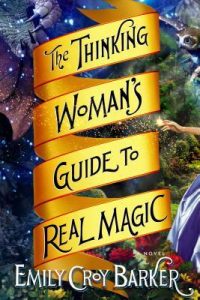
Read Along with Faye is back for the 2017 Sirens Reading Challenge! Each month, Sirens communications staff member Faye Bi will review and discuss a book on her journey to read the requisite 25 books to complete the challenge. Titles will consist of this year’s Sirens theme of women who work magic. Light spoilers ahead. We invite you to join us and read along!
What I love about the Reading Challenge is that it forces me to read outside my preferences, and I’m pushed to discover works by authors I’ve never read before. Most of the time I’m delighted. But occasionally in the case of Emily Croy Barker’s The Thinking Woman’s Guide to Real Magic, I encounter a book that simply doesn’t suit me.
When I read critically, there are parts of my brain I can’t shut off. Like, the “I love and have read a lot of fantasy” part. Or the “I’m a huge nerd and proud of it” part. Or the particularly large “I read everything through an intersectional feminist lens” part. The Thinking Woman’s Guide to Real Magic made all these parts of my brain flash warning signs, coupled with the fact that it was a long, 600-page tome that’s also a (surprise!) first of a series.
The novel starts off with our twenty-something protagonist, Nora Fischer, an English graduate student whose life is falling apart. Her thesis advisor tells her that she’s under performing and about to be put on academic probation, and her recent ex-boyfriend of several years has just invited her to his destination wedding to another gal. Because of um, masochism, Nora chooses to attend, but wanders off to an isolated part of the mountains and meets Ilissa, a glamourous faerie queen (she’s not called that, but that’s basically what she is. Surprise! Faeries!). Ilissa takes Nora on Henry Higgins-style and introduces her to a dazzling new world of beautiful people and parties, including her gorgeous faerie prince son Raclin.
Of course, because faeries are selfish monsters and treat humans as their playthings, everything turns to shit pretty quickly and Nora finds herself stuck in an alternate world where (surprise!) magic exists. The novel moves from a portal fantasy to attempt to be a pseudo-Western Europe medieval fantasy saga with politics and intrigue. With the help of the magician Arundiel, a Mr. Darcy-like character with a brooding past, Nora escapes the clutches of Ilissa and Raclin and tries to learn magic to get back to her real world.
I read somewhere that this is Emily Croy Barker’s debut novel. It borrows heavily from The Chronicles of Narnia, Pride & Prejudice, and despite Nora’s near-constant disparagement of nerd culture, Harry Potter. I found it oddly structured, with very little character growth and it dabbled in a lot of fantasy tropes without understanding or respect to their origins. Was there a reason Croy Barker’s magical world had to be built on Western Europe? It should be no surprise that patriarchy exists in the fantasy realm, but it felt like it these limitations were created just so Nora could rail against them in a burst of feminist credibility (ignoring that her burgeoning crush on Arundiel overshadows the fact that he killed his former wife).
But moreover, I found Nora to be incredibly unlikable, in a way that I’m not sure the author intended. I found her feminism problematic (the casual way she dismisses her accomplished thesis advisor: “Last fall, in a single semester, she had produced both [a] baby and a book on sexual ambiguity in Dickens”). She comes from a privileged upbringing if academic probation and her ex-boyfriend marrying another drives her to frolic among the faeries. And despite the title calling Nora a “thinking woman,” she hardly analyzes anything critically, instead remaining passive for the bulk of the story.
But your mileage may vary! If you like reluctant heroines, this book might be for you. Readers new to fantasy might not mind the varying structure and treatment of tropes. If you can stomach unlikable protagonists like Quentin from The Magicians, you may have the patience to put up with Nora. And it can be occasionally funny. The one laugh-out-loud scene from the book was when Arundiel helps Nora deliver a message to her younger sister from fantasy world to the real world, and Nora’s sister looks at him and cries, “…Snape?” Yeah, it’s that kind of book. Now onto the next!
Faye Bi works as a book publicist in New York City, and leads the Sirens communications team. She’s yet to read an immigrant story she hasn’t cried over, and is happiest planning nerdy parties, capping off a long run with brunch, and cycling along the East River.







Connect with the Sirens community
Sign up for the Sirens newsletter